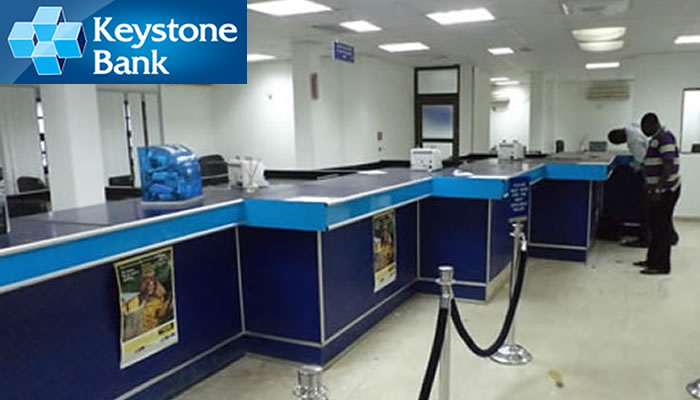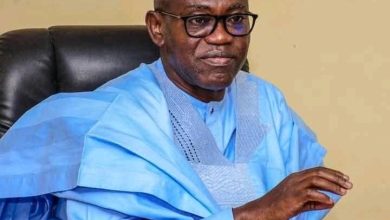How Former MD of AMCON, Malam Ahmed Lawan Kuru, Allegedly Used N20 Billion AMCON Savings To Buy Keystone Bank For His In-Law

By Mogaji Wole Arisekola
The former CEO and Managing Director of the Asset Management Corporation of Nigeria (AMCON), Malam Ahmed Lawan Kuru, was entrusted with the critical task of tackling the financial vultures who had ravaged the Nigerian banking sector through unpaid loans. These unpaid loans were the primary reason for the establishment of AMCON. However, the assignment was not just a daunting one—it was fraught with challenges and dangers, including legal battles, media attacks, and fierce resistance from those who benefited from the chaos in the financial sector.
Kuru’s role was complicated by the fact that many of AMCON’s biggest debtors held significant political power. These individuals, who owed colossal amounts to the nation, were not just businessmen but influential figures occupying key positions in government and politics. Over the years, as AMCON sought to recover these debts, it became increasingly clear that those who had played major roles in crippling Nigeria’s financial system did not take kindly to being exposed. Despite the enormous task at hand, Kuru was expected to lead a fight against these powerful individuals, many of whom operated under the protection of their high political offices.
One of the most troubling aspects of Kuru’s tenure at AMCON was his close association with some of the very people he was supposed to be confronting. It became a source of great concern when it was discovered that Kuru was frequently seen in the company of several AMCON obligors who had no business holding public office given their questionable roles in the banking sector’s collapse. These individuals, who should have been held accountable, continued to occupy top government positions while evading justice. Kuru’s dual relationship with them—dining with them at night while pretending to fight them during the day—raised serious ethical questions.
During his time at AMCON, Kuru allegedly engaged in several questionable transactions that benefitted his close associates and family members. One of the most egregious instances was his involvement in the sale of Keystone Bank. According to investigations carried out by independent auditors, Kuru collaborated with the former Central Bank of Nigeria (CBN) Governor, Godwin Emefiele, to use AMCON’s N20 billion savings deposited in a first-generation bank as collateral to purchase an 80% stake in Keystone Bank. The shares were reportedly acquired on behalf of his father-in-law. This transaction, which should have been a transparent and competitive process, was instead shrouded in secrecy and executed to benefit Kuru’s family.
Kuru’s questionable actions did not stop at the acquisition of Keystone Bank. He is also accused of selling several valuable assets seized by AMCON at giveaway prices to his cronies. One glaring example is the sale of an oil rig stationed at Marina in Lagos. The rig, which was valued at over $300 million, was eventually sold by AMCON for a paltry N130 million—a fraction of its actual worth. The rig sale is just one among many questionable deals that took place under Kuru’s watch.
Furthermore, many of the properties seized by AMCON, worth millions of naira, were either sold at ridiculously low prices or given away for next to nothing. In some cases, the properties were simply handed over to Kuru’s associates without any competitive bidding process, leading to massive losses for the federal government. These actions have raised serious concerns about how AMCON, under Kuru’s leadership, handled the recovery and sale of assets meant to recoup taxpayers’ money.
Another controversial transaction during Kuru’s tenure involved the takeover and subsequent sale of the Ibadan Electricity Distribution Company (Ibadan Disco) by AMCON. At the time AMCON took control of Ibadan Disco from its core investor, the company was valued at over N90 billion. However, under Kuru’s directive, AMCON claimed to have concluded the bidding process to sell the asset at just N47 billion. This figure was seen as suspiciously low, given the value of the company. However, before the sale was finalized, President Bola Ahmed Tinubu intervened by sacking Kuru and suspending all ongoing sales of AMCON assets.
Following Kuru’s exit, the newly appointed MD of AMCON was instructed by the CBN Governor to re-evaluate the Ibadan Disco deal and engage independent valuers to reassess the asset. After the re-evaluation, Ibadan Disco was eventually sold for N100 billion—a staggering N53 billion more than the amount initially quoted by Kuru’s team. This significant discrepancy in the valuation of the asset, uncovered within just two weeks of Kuru’s departure, highlighted the level of financial mismanagement and possible corruption that had occurred under his administration.
The extent of the rot within AMCON during Kuru’s leadership is immense. The corporation, which was established to clean up the financial mess caused by bad loans and restore stability to Nigeria’s banking sector, became a tool for further enriching a select few at the expense of the nation. The level of corruption and mismanagement under Kuru’s watch calls for a thorough overhaul of AMCON’s management structure. There is an urgent need for comprehensive investigations into the corporation’s past dealings, especially those carried out under Kuru’s tenure. Accountability and transparency must be restored if AMCON is to fulfill its mandate and regain public trust.
In addition to his questionable business dealings, Kuru’s tenure was also marked by a lack of transparency in decision-making processes. Numerous deals were struck behind closed doors, with little to no oversight from relevant authorities. The opacity surrounding these transactions fueled suspicions that Kuru was more interested in personal enrichment than in recovering debts owed to the Nigerian people. The sale of AMCON assets, which should have been conducted openly and competitively, was instead characterized by backroom deals that benefitted a privileged few.
The magnitude of corruption within AMCON under Kuru’s leadership is alarming and requires urgent attention by EFCC to prosecute who ever involved in this criminal act. For AMCON to achieve its original purpose of stabilizing Nigeria’s financial sector, during the tenure of the new managing director appointed by President Tinubu, the government must ensure that AMCON board will be managed by individuals of integrity who are committed to serving the public interest. Only through such measures can AMCON regain its legitimacy and fulfill its mandate to recover Nigeria’s lost assets and restore financial stability.
Mogaji Wole Arisekola writes from Ibadan.








